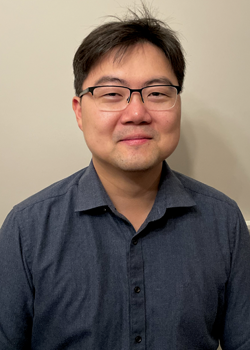The Middleman

Wonhee Ko
Wonhee Ko is comfortable in the middle—somewhere between theory and experiment; industry and academia. His experience brings a distinctive perspective to his role as an assistant professor, where he's both a quantum science researcher and a mentor to young scientists.
Ko discovered an affinity for physics early on.
"I just had a general interest when I was a kid," he said. "Then around middle school I started to learn physics as a separate class and it sounded really cool to me."
A native of South Korea, Ko said science competitions were common in his early education and that's where he started to gain confidence.
"We had this physics competition and I had a good score," he said. "My teacher tried to make me take this specialized class. Learning physics theories (was) very interesting and I was good at it, so I tried to do more and more."
Ko went on to earn a bachelor's degree in physics and math from Seoul National University. Next came a PhD in applied physics from Stanford University. His dissertation was based on quantum imaging of materials, an expertise he continues to develop and brought with him to UT.
"Quantum is what happens when you look at the very small things; as small as individual atoms," Ko explained. "At the small scale, things behave differently from our intuition." Researchers see this shift as the threshold for a new, post-silicon world.
"This is very useful to make new devices and new electronics," Ko said. "You can do a lot of very useful things. Now people are trying to make quantum computers out of it. That part I'm really interested in."
Ko's tool of choice is the scanning tunneling microscope, or STM. This instrument images a material's surface all the way down to the individual atoms. An STM works by running a sharp metal wire tip over a surface with an electrical voltage applied to either the tip or the material. Ko is interested in taking this a step farther by coming up with novel capabilities to find, and control, new quantum phenomena.
"(The) STM is a well-established tool," he said. "It's been there for 30 years. People know how to use it for conventional things. I'm very interested in quantum information science and for that you need to control individual quantum states. A normal metallic tip cannot do that, so to reach that goal you have to be creative and put new functionality into this machine. That's what motivates me." Ko sees possibilities in changing the probe material—like using a superconducting tip—which he said "can give you a lot of new physics. Changing one material gives you many more capabilities."
Ko has firsthand knowledge of how science like this plays out in the private sector. After finishing his doctorate, he spent four years on the research staff at the Samsung Advanced Institute of Technology.
"I kind of understand why it's important for industry people," he explained. "Making something (that) works right now is very important. They don't care how much it costs if it works. It's a very different mindset."
What's missing in industry, he explained, is the chance to do basic, fundamental research, which is where his interests lie.
"This experience made me want to come back to academia," he said.
He came to UT first as a postdoctoral research associate and worked in Oak Ridge National Laboratory's Scanning Tunneling Microscopy Group. He officially joined the university's physics faculty in August 2022 as part of the Quantum Materials for Future Technologies research cluster.
"UT has a very strong materials science background and also a very strong condensed matter theory background," he said. "I think I can really go in between that: get the materials, get help from the theory people, and then get new science out of this collaboration."
Ko is always on the lookout for students as he builds his research program. Part of academia's appeal is the opportunity to work with young scientists. His first semester he co-taught the modern physics laboratory course and coordinated the department's condensed matter physics seminars. The spring 2023 term had him teaching a Careers in Physics seminar. This is natural fit for Ko, who also volunteers his time as a career mentoring fellow for the American Physical Society.
"I want the students to find the right career for them," he said. "If they find research is their career, I really want to help them become independent researchers. That's my educational goal."
Ko's avocations make him a relatable figure for the next generation. In addition to time with family, he likes to pursue hobbies like cooking with a little help from one of students' favorite resources.
"I watch all kinds of YouTube," he said laughing.
Back to Cross Sections, Spring 2023